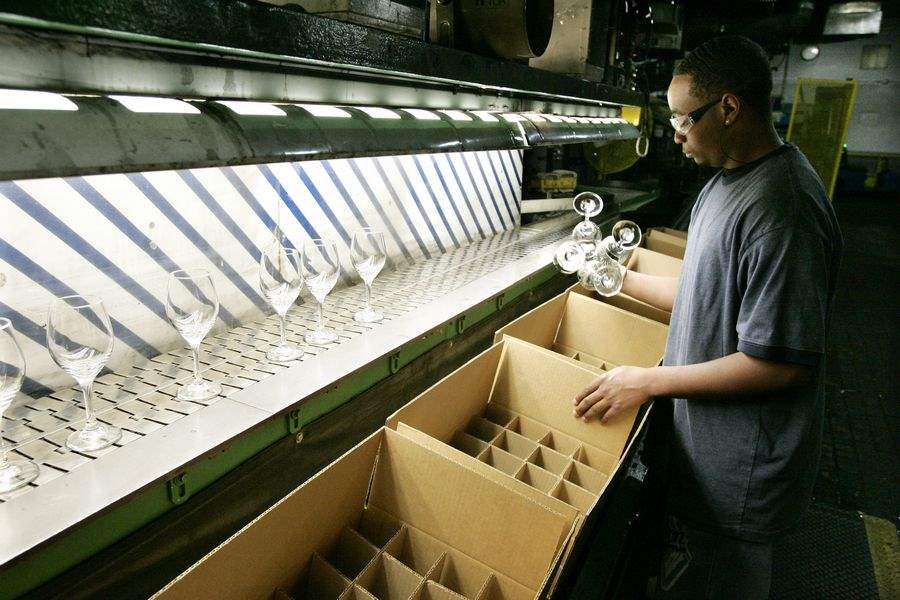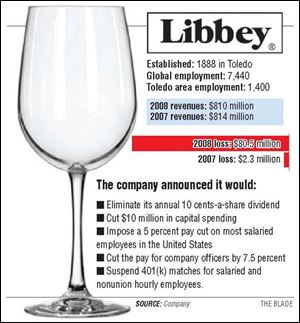
Libbey cuts pay, freezes dividend; actions aim to add cash flow
2/12/2009
Toledo-based Libbey Inc. lost $80.5 million last year, most of it in the last quarter. The retail and commercial table glass and dishware company braced itself for more tough times in 2009.
The Blade/Dave Zapotosky
Buy This Image

Libbey Inc., one of Toledo's oldest and most widely known companies, yesterday reported a massive loss for the fourth quarter and for all of 2008, prompting employee pay cuts and the end of its stock dividend.
The retail and commercial table glass and dishware company, founded in Toledo 121 years ago, reported a loss of $69 million for the fourth quarter and $80.5 million for the year.
With its fortunes closely tied to the struggling restaurant industry, the company said its revenues fell more than 17 percent to $187 million in the fourth quarter and were essentially stagnant at $810 million for the year.
"We expect a challenge of historic proportion in 2009 given the economic climate, and we plan to meet it head-on," said John Meier, Libbey's chairman and chief executive officer.
The financial picture spurred the company board to impose a 5 percent pay cut on most U.S.-based salaried employees and a 7.5 percent pay cut on all officers of the firm, and to suspend 401(k) matches for all salaried and nonunionized employees.

Toledo-based Libbey Inc. lost $80.5 million last year, most of it in the last quarter. The retail and commercial table glass and dishware company braced itself for more tough times in 2009.
Libbey also suspended its annual 10 cents-a-share dividend, marking the first time the company will not pay a dividend since it began trading its stock in 1993.
The moves, which included no new job cuts or plant closings, are expected to increase cash flow by approximately $50 million this year, company officials said.
The stock market reacted negatively. Libbey's stock, trading as LBY on the New
York Stock Exchange, plunged through the $1 threshold and closed yesterday at 95 cents a share, down 21 percent for the day.
It marked a 95 percent decline from the $17.57 price on April 1, 2008.
Analyst Arnie Ursaner, president of CJS Securities Inc., in White Plains, N.Y., said that despite its tough financial performance, Libbey has greatly increased its strength among its competitors.
"I don't know when we're going to have a pickup in retail, but what we do know is that their market share has gone from 26 percent to 40 percent," Mr. Ursaner said.
"When it does come back, they're going to be incredibly well positioned."
Mr. Meier, the CEO, said that the company had been on track "to have a record year" in 2008 through August, but the financial crisis that struck the global economy in September shattered the glassmaker's performance in the fourth quarter.
The firm's fourth quarter loss of $4.68 a share was noticeably worse than its loss of 34 cents a share, or $5 million, for the same quarter of 2007.
For 2008, the company known by consumers for its table glasses and for its Syracuse China tableware brand reported a loss of $5.48 a share, much worse than its loss of 16 cents a share, or $2.3 million.
Analysts had anticipated a loss of between 79 cents and $2.27 a share for the year.
Included in Libbey's fourth quarter loss was a $29.1 million restructuring charge from its decision to close by summer its Syracuse China factory in Syracuse, N.Y., and a distribution center in Mira Loma, Calif. Those moves will eliminate 305 jobs.
The company has cut another 500 jobs since October from operations overseas.
Libbey Treasurer Ken Boerger said that "several hundred" salaried, nonunionized employees in the company's Toledo headquarters and its Ash Street factory will have their pay cut by 5 percent.
Officers of the company, including himself and Mr. Meier, will have their salaries cut by 7.5 percent.
Asked why the discrepancy, Mr. Boerger said the larger cut "shows that we're all in this together."
Unionized Libbey employees are in the middle of a bargaining agreement that expires in September, 2010, so they won't face the wage cut this year, Mr. Boerger said.
The Toledo firm has increased its debts in recent years as it sought to expand both its sales and its manufacturing footprint overseas.
It purchased the other half of a large glass plant it partly owned in Mexico and built a state-of-the-art glass plant in China to lower its overall production costs, but its loans and credit to buy and operate those facilities and other operations have high interest rates and debt servicing charges that eat into the company's bottom line.
The company's long-term debt increased by almost $50 million in 2008 and its balance sheet showed that it went from repaying $7 million in debt in 2007 to borrowing an additional $14 million in 2008.
In an economic landscape where cash is king, Libbey's remaining access to cash dwindled significantly last year.
Libbey reported $13.3 million in cash on hand and $44.6 million left that it could borrow under its credit agreements, compared with the $36.5 million of cash on hand and $89.7 million borrowing available at the end of 2007.
Still, Mr. Ursaner, the analyst, said he sees little chance that Libbey would be forced into bankruptcy protection, crediting the company's management for taking "extremely aggressive" action in response to the economy.
Bankruptcy "is an extremely small risk for the next several years because they have nothing that would trip them into that," in terms of violating covenants or repayment issues, he said.
The cuts the company announced "is real cutting into muscle and bone in Toledo. This management team is being forced to take tremendous steps because of the economic environment."
Contact Larry P. Vellequette at:
lvellequette@theblade.com
or 419-724-6091.